Here at HomeViews, we ask reviewers to rate the value that they think their property offers, as it’s a key consideration for buyers and renters. Sometimes more expensive developments get high ratings for value and other, much cheaper, buildings can be rated poorly on value. It’s all about what you get for the price! Just for fun, we thought we’d have a look at London’s most expensive street – Kensington Palace Gardens. How much value for money do you think residents on Billionaire’s Row are getting?
Kensington Palace Gardens vs. other London streets (Updated July 2024)
Properties on Kensington Palace Gardens go up for sale so rarely, it’s tricky to find an average property price. Rightmove’s latest data (July 2024) shows an average price of £21,500,000, but this comes from a single property sale on Billionaire’s Row over the last 12 months, and an apartment at that.
Despite the lack of clear data, it’s clear Kensington Palace Gardens is strictly a mega-rich buyer’s prospect. Even for London housing prices, this is a seriously daunting starting position. However, if you happen to be a global business tycoon or actual royalty, you’ll barely need to haggle!
Halifax published a list of the UK’s most expensive streets in 2023. This was based on sales data between 2018 and 2023, and surprisingly, Kensington Palace Gardens didn’t feature on the list. However, with the street only listing one property sale in that period, it’s easy to see why they left it out.
Top of Halifax’s list was Grosvenor Square, with an average sale price of £20,347,000. In 2020, estimates placed the average value of Kensington Palace Gardens properties at around £35,000,000. This would place it far ahead of all other contenders.
Average property prices of London’s most expensive streets (July 2024)
- Grosvenor Square (£20,347,000)
- Clarendon Road (£19,963,000)
- Knightsbridge (£19,949,000)
- Phillimore Gardens (£19,113,000)
- Ilchester Place (£17,678,000)
- Grosvenor Crescent (£16,397,000)
- Ashburton Place (£15,048,000)
- The Little Boltons (£14,925,000)
- Chepstow Villas (£14,775,000)
- Chelsea Square (£14,666,000)
Where is Kensington Palace Gardens?
Kensington Palace Gardens occupies a prime piece of Crown Estate land in the west of London, on the western edge of Kensington Gardens, which adjoins Hyde Park. It connects two of the most exclusive areas in London – Notting Hill and Kensington. Famous London attractions, including the Royal Albert Hall, the Natural History Museum, and of course, Kensington Palace, are right on its doorstep.
Can anyone walk down Kensington Palace Gardens?
Although Kensington Palace Gardens has gated security for vehicle access, it’s fine to walk or cycle down the street. The road is owned by the Crown Estate, with vehicles only allowed access if they have a valid security pass. The half-mile long Billionaire’s Row provides a scenic and convenient route between the bustling Notting Hill Gate and Bayswater Road to the north and Kensington High Street to the south.
UPDATE June 2024: As of 7th June 2024, Kensington Palace Gardens has been closed with indefinite effect to the public, following complaints about speeding cyclists. Currently, the Crown Estate is undertaking a review to decide what can be done to improve safety on this half-mile road for every resident who lives in Kensington Palace Gardens, as well as the pedestrians and cyclists passing through.
Read more
Who lives in Kensington Palace Gardens?
So, who lives in Kensington Palace Gardens? While the properties along this storied and famously pricey street are uniformly gorgeous, they broadly fall into three categories – royal residences, diplomatic embassies and the not-so-humble homes of the fabulously wealthy.
It’s partly for this reason that Kensington Palace Gardens has remained top of the average price list for so long. Streets that attract a reputation for being desired by the rich and famous set themselves up for future price hikes. Just being on ‘the street’ with neighbours like these is a status symbol all of its own.
Combine this with the fact that such properties so rarely come onto the market, and you’ve got a street name adding millions to the asking price. This isn’t a new phenomenon, Kensington Palace Garden was known as ‘Millionaire’s Row’ all the way back in 1860. Over the last 160 years, the millionaires have become billionaires as the allure of the street has steadily grown. Hence the current nickname: Billionaire’s Row.
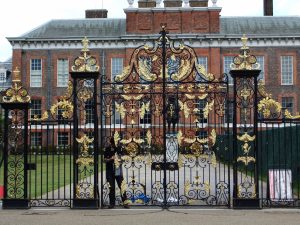
Kensington Palace: Next-Generation Royalty
London’s most expensive street runs along Kensington Gardens between Notting Hill and Kensington, but the palace itself provides its name. Prince William and the Duchess of Cambridge called the palace home until 2022, while Princess Eugenie and her husband Jack Brooksbank currently do.
The Duke and Duchess of Cambridge moved as a family to Berkshire in late 2022. They and their children used to ‘make do’ with an impressive 20 rooms spread over four storeys while staying here. However, their official address was a rather underwhelming “Apartment 1A”. Before leaving, they apparently had over £12 million worth of renovation works done to Apartment 1A, to make it more family-friendly. Now though, it seems that the country life is a better fit for them as a family.
The Princess Eugenie and her family live within the palace grounds at Ivy Cottage. If you’re thinking of a quiet little thatched number, think again. While smallish at only three bedrooms, Ivy Cottage is still a sumptuously decorated and extensively renovated affair.
The couple will soon end their time at Ivy Cottage. They will make the move next year to Frogmore Cottage – previously used as Prince Harry and Megan Markle’s Windsor digs.
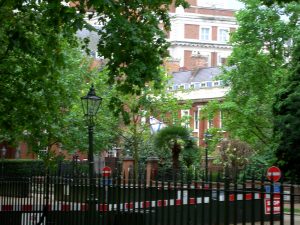
Embassies and Ambassadorial Residences in Kensington Palace Gardens
Boasting an impressive eight embassies and ambassadorial residences, Kensington Palace Gardens is something of a diplomatic magnet. And why not? If your intention is to impress your own citizens and visiting dignitaries, then a grand building on London’s most expensive street can certainly have that effect.
2 Kensington Palace Gardens – Israeli Embassy
The first of the embassies on Billionaire’s Row belongs to Israel. As you’d expect, security here is exceptionally tight, but the embassy itself is also rather beautiful after its major facelift in 2010.
5-7 Kensington Palace Gardens – Russian Embassy
This large, lavish and unrepentantly stylish white-stuccoed building has hosted Russian diplomats and their guests since 1929. The formal residence of the current Russian ambassador, Alexander Vladimirovich Yakovenko, is just a few doors down at Number 13.
(UPDATE March 2022:) The Russian Embassy has been the centre of swirling protest actions since the Russian war of aggression against Ukraine began. Most recently, Rosamund Pike joined protestors, specifically in protest of journalists killed by Russia during the war. On March 22, the embassy building had the colours of the Ukrainian flag beamed onto it, by the same group.
(UPDATE March 2023:) A group of four political activists were arrested in March 2023 for painting a 500-square-metre Ukrainian flag on the road directly outside the Russian Embassy. The activists said that they did it to mark the anniversary of the conflict.
UPDATE February 2024:) Crowds gathered outside the embassy to hold a vigil for outspoken critic of the Kremlin, Alexei Navalny, after his death in a Siberian penal colony.
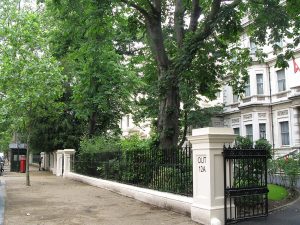
12a Kensington Palace Gardens – Nepalese Embassy
Another beautiful example of Victorian architecture at its finest, the Nepalese Embassy was built in 1863. There were rumours flying around in 2013 that the Nepali Government wanted to sell the building for £100 million, since its maintenance is proving hugely expensive, but that sale never came to pass.
While expensive, the building is certainly a feast for the eyes. And really, isn’t that what counts when setting the scene for diplomatic scenarios?
14 Kensington Palace Gardens – Finnish Ambassador Markku Keinänen’s residence

While the Finnish Embassy itself is in Belgravia – another hotspot for embassies – the Finnish Ambassador’s Residence is in Kensington Palace Gardens. The current ambassador, Markku Keinänen, has been here since 2019 and the residence is a popular site for all manner of diplomatic and social gatherings.
21 Kensington Palace Gardens – Lebanese Embassy
Another beautiful building built in the Victorian era, the Lebanese Embassy has a commanding presence even on this most impressive of streets.
Whitewashed facades and black iron railings are firmly in vogue for all manner of ambassadorial residences and residents across this remarkable street.
This embassy is set well back from the road, with few trees to the front. This means it’s easy to enjoy the full spectacle of the building when approaching it or simply when walking past.
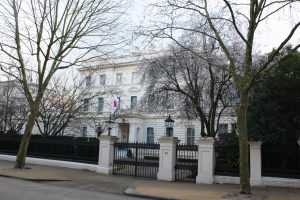
23 Kensington Palace Gardens – Japanese Ambassador’s residence
Like the Finns, the Japanese diplomatic mission has its ambassador’s residence here but the main embassy building elsewhere, Piccadilly in this case.
Once again, it’s an elegant white stuccoed affair, complete with signature black iron railings. Also set back from the road, it’s easy enough to take in the view of the entire building from outside the gates while standing on the pavement.
In an interview with the Financial Times in 2016, the then ambassador Koji Tsuruoka showed off the garden’s rather spectacular rose bushes. Not to mention many priceless works of Japanese art housed inside.
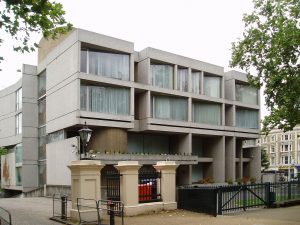
25 Kensington Palace Gardens – Slovakian Embassy
This embassy is a departure from the previous ones, architecturally speaking. It was built in 1965 under the new Brutalist style – making it a more ‘big and boxy’ affair!
It may not have all of the classic appeal of other embassies on this storied street. However, the Slovakian Embassy is still an architectural delight. It demands your attention even when viewed from the pavement.
26-30 Kensington Palace Gardens – Czech Republic Embassy
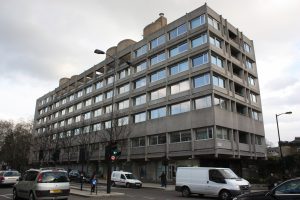
The Czech Republic’s embassy shares the same compound as Slovakia’s, as the two countries divided it between them once Czechoslovakia was dissolved in 1993.
These buildings range across the architectural styles of London’s history, though tasteful reserve is the unifying theme. Beautiful cream stuccos, gleaming black railings and millimetre-perfect privet hedges welcome visitors with a sense of undisturbed grace and decorum. Naturally, this is exactly what you want to feel when going to get a visa stamped.
Since imitation is the sincerest form of flattery, it’s not surprising that so many embassies are clustered along one famous street.
Millionaires and Billionaires in Kensington Palace Gardens
Alongside their royal and diplomatic neighbours, the business tycoons and celebrities add a little colour and lots more money to the street. They come from a highly diverse set of different backgrounds, from Russian oligarchs to English socialites, though they all boast property portfolios to die for.
One major advantage that the street’s residents can enjoy is the added safety it offers. Such a concentration of royal, diplomatic and wealthy private individuals are protected by a wide range of security measures. Both ends of the street have security checkpoints manned by armed guards, while crash barriers, sniffer dog teams, CCTV and other electronic surveillance technologies cover the entirety of the street.
(UPDATE March 2023:) If there are any millionaires/billionaires reading, then your luck might be in if you want to live on London’s most expensive street. This month, a new Swiss boutique real estate firm, Whisper Auctions, is planning to offer an exclusive villa in Kensington Palace Gardens via private auction. Bids are expected to reach and possibly exceed £100 million.
8 Kensington Palace Gardens (Estimated property value: £70 million)
Owner: Tamara Ecclestone
Daughter of Formula 1 Chief Executive Bernie Ecclestone, Tamara is an art-lover, model and social media personality. Her Kensington Palace Gardens mansion offers 57 rooms of wall-to-wall luxury including quirky features such as a gold free-standing bathtub, a room dedicated purely to designer handbags and a £10,000 miniature replica of the mansion which serves as a playhouse for her daughter Sophia.
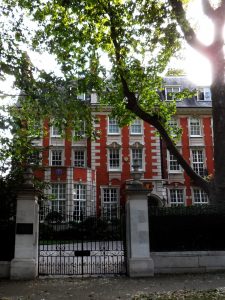
10 Kensington Palace Gardens (Estimated property value: £120 million)
Owner: Jon Hunt
Jon Hunt founded Foxtons and sold off the major estate agency for £390 million at the height of the housing boom in 2017. Two years previously he bought number 10 Kensington Palace Gardens for just £14 million.
Almost immediately, he launched into building a vast underground complex for his car collection, plus a swimming pool and tennis court. Despite a gruelling 10-year legal battle and repeated complaints from his neighbours at the French Embassy, he successfully finished it.
The cost of expansion and renovations is thought to be in the tens of millions of pounds. If he decides to sell, Jon Hunt is likely to make a good return on his investment. In 2012, he was reportedly offered the fantastical sum of £300 million for the property by his neighbour, steel tycoon Lakshmi Mittal.
15a Kensington Palace Gardens (Estimated property value: £110 million)
Owner: Wang Jialin
The £80 million asking price for a spot on Billionaire’s Row didn’t put a dent in the pocket of China’s then-richest man back in 2005. Since then, movie mogul Wang has extensively renovated his mid-Victorian era property, spending tens of millions expanding, restoring and updating this labour of love. From its massive column-lined indoor pool to its period feature inner courtyard, this mansion is as architecturally impressive from within as without.
17 Kensington Palace Gardens (Estimated property value: £125 million)
Owner: Roman Abramovich
A global businessman and politician with an estimated net worth of over £10 billion, Roman bought his Kensington Palace Gardens mansion in 2009 for a reputed £90 million. The 15-bedroom, cream-coloured mini palace wasn’t to Roman’s taste at purchase, so he continues to renovate it. The latest upgrades include widening the terrace, building a new skylit pool and expanding the underground complex with 4,000 extra square feet of living space.
The house forms part of a range of the former Chelsea owner’s assets that were frozen by the UK government in the wake of Russia’s invasion of Ukraine. It’s unclear what’s happened to the property since then, but it was reported that Abramovich was finding it impossible to pay hefty ground rents owed to The Crown, and couldn’t even send cleaners to access the property.
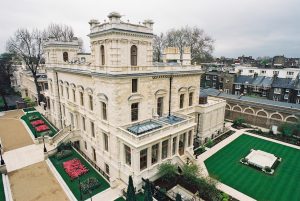
18-19 Kensington Palace Gardens (Estimated property value: £168 million)
Owner: Lakshmi Mittal
When you amass an estimated fortune of over £7 billion, nicknames come thick and fast. Lakshmi Mittal made his fortune in steel and is often known as the ‘Carnegie of Calcutta’, after Andrew Carnegie the famously successful (and often ruthless) American steel baron.
Lakshmi moved his family to London in the mid-90s and bought his 55,000 square foot mansion from Bernie Ecclestone in 2004 for £57 million. Complete with swimming pool, 12 bedrooms and all the other obligatory fanciness, the house also features marble from the same quarry as that used for the Taj Mahal – this piece of trivia led to the house being known by Lakshmi’s intimates as the ‘Taj Mittal’.
After settling in, Lakshmi decided he liked the street so much that he bought another two houses on it. Number 9A was secured for a cool £117 million and another nearby property went for £70 million. He gifted these to his son and daughter respectively, giving the Mittal family quite the presence on London’s most expensive street.
20 Kensington Palace Gardens
Owner: The Sultan of Brunei
Kensington Palace Gardens isn’t just home to English royalty; the Sultan of Brunei has kept this sumptuous mansion for over three decades. Although it was bought for an undisclosed sum, the price tag couldn’t have bothered the sultan overly, since his personal annual income was estimated at £1.5 billion. Adding to a personal fortune of over £30 billion, individuals of this level of wealth often have to try hard to spend it.
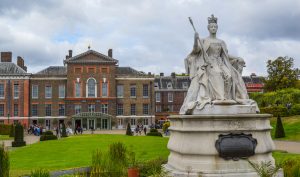
Buyers still looking for openings on London’s most expensive street
Technically, the Crown Estate owns all of the freehold on the entirety of Kensington Palace Gardens. This means that even its billionaire residents are leaseholders to royalty. This doesn’t seem to put off potential buyers though, with prices still going up.
Even though deals on these properties are made behind closed doors via very expensive go-betweens, the allure of Kensington Palace Gardens means that there’s no shortage of people willing to pay whatever it takes to be on London’s most expensive street.
Looking for slightly more reasonably priced properties to rent, buy or buy to rent in London? Our guides are a great place to start.
HomeViews is the only independent review platform for residential developments in the UK. Prospective buyers and tenants use it to make an informed decision on where to live based on insights from carefully verified resident reviews. Part of Rightmove since February 2024, we’re working with developers, house builders, operators, housing associations and the Government to give residents a voice, recognise high performers and to help improve standards across the industry.






















